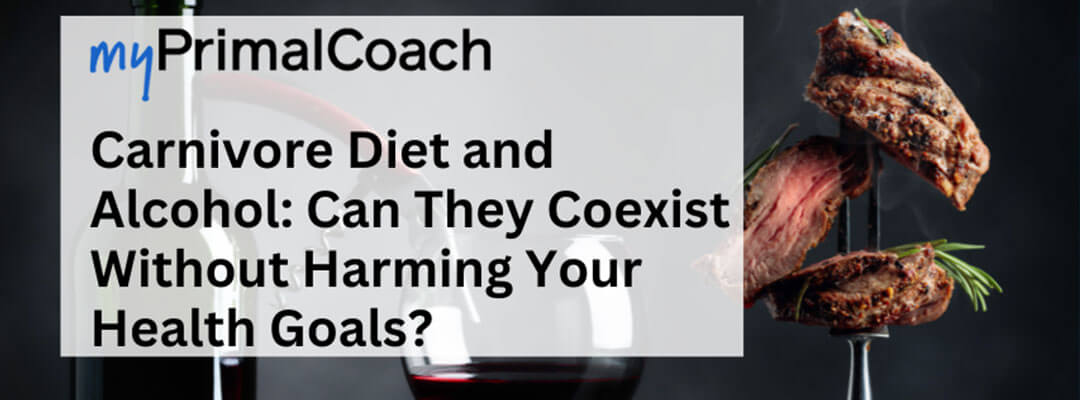As more people embrace the carnivore lifestyle, understanding how occasional indulgences like alcohol can impact this extreme all-meat eating plan is trending online. But does the carnivore diet and alcohol really work together?

The carnivore diet and alcohol - can you make it work?
Many carnivore dieters turn to this solely animal-based eating plan to improve metabolic health, relieve chronic symptoms, and enhance weight loss efforts. When it comes to achieving these health goals, the carnivore diet and alcohol often clash, with alcohol acting as a major disruptor.
In this post we dive into what the carnivore diet is. We also explore the impact of consuming alcohol while eating a carnivore diet.
The Carnivore Diet: A Quick Overview
The carnivore diet is a restrictive elimination diet that involves consuming only animal-derived products and excluding all plant-based foods. Your day-to-day food choices include:
✅ Allowed foods:
- Red meat (beef, lamb, pork)
- Organ meats (liver, kidney, heart)
- Fish and seafood (salmon, tuna, oysters, shrimp)
- Eggs
- Limited dairy (butter, ghee, hard cheeses, heavy cream)
- Bone broth, mineral water, salt, and pepper
❌ Foods strictly excluded:
- Fruits and fresh fruit
- Vegetables and plant foods
- Grains (wheat, barley, rice, corn)
- Legumes (beans, lentils)
- Nuts and seeds
- Sugars, sugar substitutes, and processed plant foods
- Processed foods and sugary cocktails
Unlike the ketogenic diet or primal eating plans, the carnivore diet eliminates carbs almost entirely, making it a zero-carb or extremely low-carb diet. Advocates claim its nutrient density, high fat, and anti-inflammatory benefits can improve physical and mental health, from blood sugar control to stress relief and reduced inflammation.
However, critics warn of nutritional deficiencies, such as lack of fiber, Vitamin C, and certain essential nutrients. There isn’t enough long-term research to confirm its safety for all health conditions, though short-term studies show reduced inflammation and improved symptoms for autoimmune and digestive issues.
For example, a 2020 study in Current Developments in Nutrition analyzed over 2,000 carnivore dieters, reporting improvements in chronic conditions like arthritis, obesity, and anxiety.
The Carnivore Diet and Alcohol: Health Risks and Effects
So where does alcohol fit into this strict carnivore journey? Unfortunately, combining the carnivore diet and alcohol can interfere with the health benefits of the diet in several ways.
1. Carnivore Diet and Alcohol: Slows Down Your Metabolism
Many people follow the carnivore diet to lose weight, but alcohol metabolism takes priority in the liver. Alcohol is treated as a toxin. While the liver focuses on breaking it down, fat metabolism and ketone production pause. This metabolic state disruption can hinder weight loss efforts or even cause weight gain due to extra calories from alcohol’s high calorie and carb content – despite its lack of essential nutrients.
2. Carnivore Diet and Alcohol: Increases Cravings and Poor Food Choices
The carnivore diet and alcohol combination can increase cravings. Alcohol intake activates the brain’s reward centers, leading to cravings for high-carb, sugary foods excluded on the carnivore diet. Impaired decision-making while drinking can result in impulsive food choices, sabotaging your eating habits and mental health goals.
3. Carnivore Diet and Alcohol: Amplifies Hangovers and Discomfort
Hangovers may feel more intense on the carnivore diet because carbs normally buffer alcohol’s effects. Without carbs, alcohol absorption speeds up, blood sugar levels drop, and dehydration worsens due to reduced glycogen stores. This leads to amplified discomfort, electrolyte imbalances, and longer recovery times.
4. Carnivore Diet and Alcohol: Contributes to Nutritional Deficiencies and Inflammation
Alcohol depletes B vitamins, magnesium, and zinc – nutrients essential for energy, mood, and metabolic health. Combined with the carnivore diet’s restrictive nature, regularly drinking alcohol increases the risk of deficiencies, serious health consequences, and inflammation, undermining the diet’s anti-inflammatory benefits.
Additionally, excessive alcohol intake increases the risk of alcohol use disorder, liver cancer, cardiovascular disease, and certain health conditions such as metabolic syndrome and insulin resistance.
Best Alcohol Choices for Carnivore Dieters
If you choose to pair the carnivore diet and alcohol, select options with fewer carbohydrates and minimal additives to reduce unfavorable health effects:
✅ Spirits (Best Options)
- Vodka, gin, tequila, and light rum (zero carbs)
- Whiskey (zero-carb but higher in congeners)
- Drink neat, on the rocks, or with non-caloric mixers like soda water
✅ Dry Wine (Drink Sparingly)
- Dry red wines (Cabernet Sauvignon, Pinot Noir, Merlot)
- Dry white wines (Sauvignon Blanc, Pinot Grigio, Chardonnay)
- Avoid sweet wines, sugary cocktails, and popular mixed drinks
❌ Beer (Generally Avoid)
- Dark beers are high in carbs and calories
- Light beer options have lower carbs but introduce grains and sugars
- Even keto-friendly beers can disrupt ketosis and trigger inflammation
Should You Drink Alcohol on the Carnivore Diet?
Combining the carnivore diet and alcohol can lead to:
- Slower weight loss and hindered fat metabolism
- Increased cravings and impulsive food choices
- Amplified hangovers and dehydration
- Nutritional deficiencies and higher inflammation
- Health issues such as liver damage, metabolic syndrome, and increased risk of serious health conditions
While an occasional drink may seem harmless, regular alcohol use carries long-term health risks. Evaluate whether the carnivore diet and alcohol align with your health goals or if drinking undermines the benefits of this meat-only diet.
Ready to Optimize Your Carnivore Journey?
Curious about the carnivore diet and alcohol or navigating strict diets while maintaining a healthy lifestyle? A myPrimalCoach
is always ready to support your health goals.

